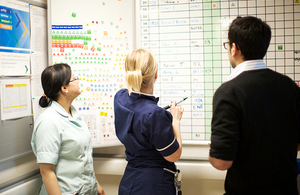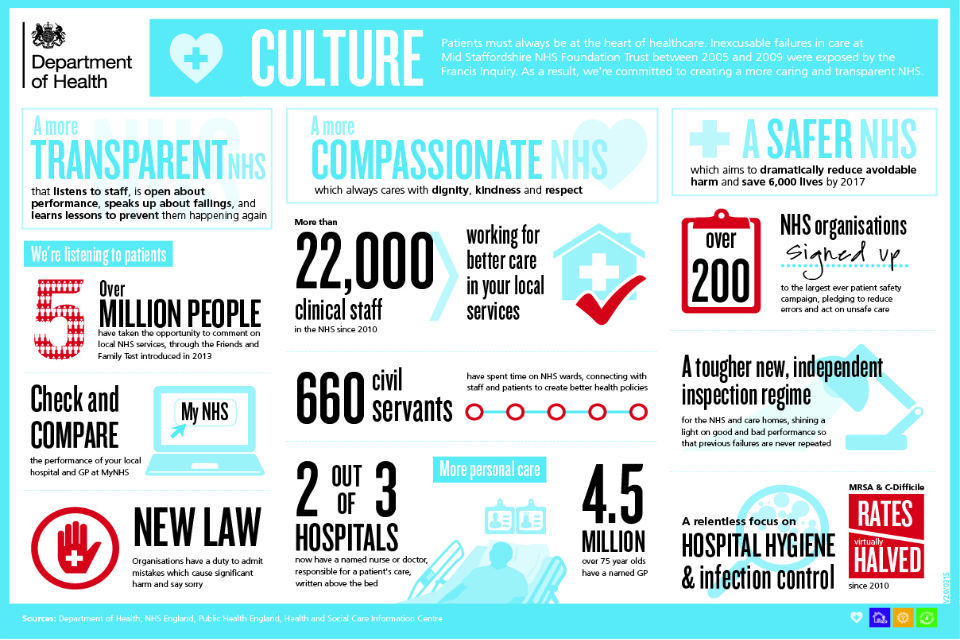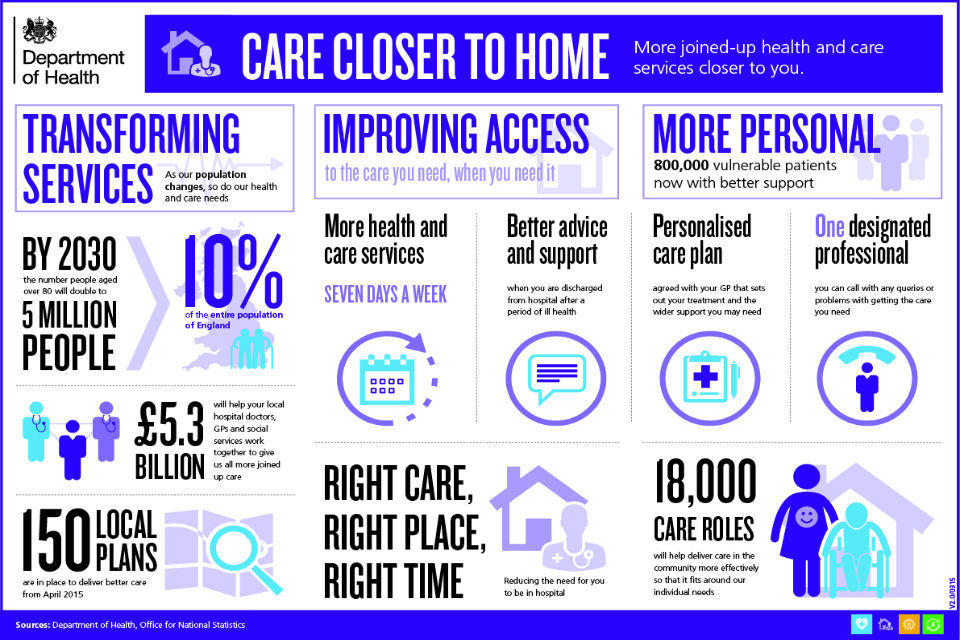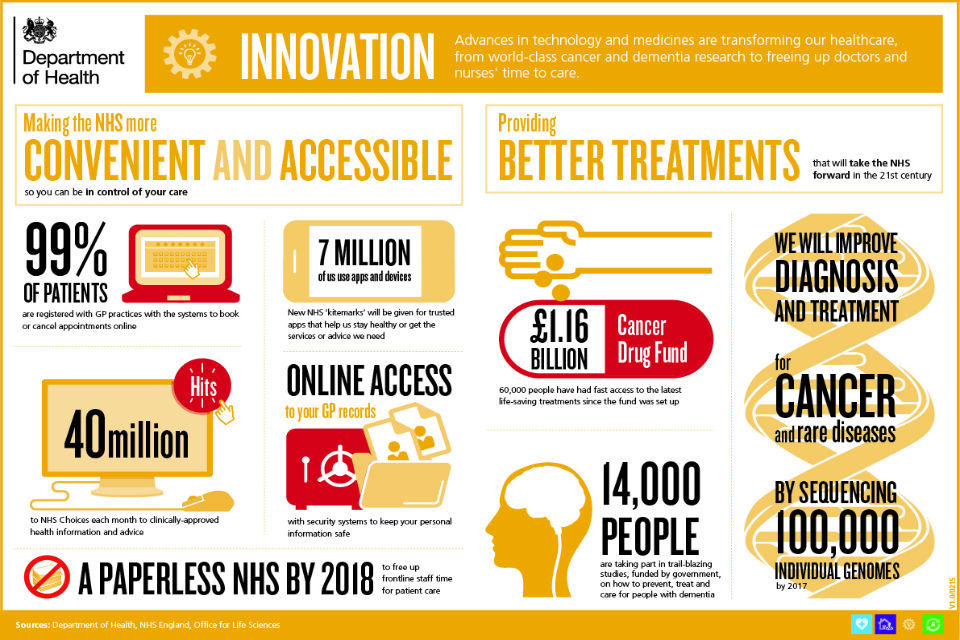Improving health and care
Latest workforce statistics demonstrate government's success in supporting the NHS.

NHS staff
The latest workforce statistics, released this morning, show the strides made by the government to support the NHS in delivering the highest quality of care for patients, with a focus on improving people’s experience of care and supporting the service to rise to the health challenges of an ageing population. Since 2010 there are 9,500 more doctors and 6,900 more nurses providing healthcare.
This is the latest example of the government’s commitment to the NHS and to patients – to building a culture of compassion, safety and transparency, improving care closer to home, encouraging innovation and continuing to protect and increase funding for the service.
Investing in the NHS

Investing in the NHS
The tough decisions we have taken to strengthen the economy have allowed us to protect and increase the NHS budget and we are investing and additional £2 billion in the frontline from next month.
In return the NHS is delivering a considerable increase in activity and achieving record levels of productivity according to the Office for National Statistics.
We have also made great strides to improve how effectively the service spends its money – removing waste and red tape, saving £1.5 billion since 2010 - money reinvested in frontline services for patients.
We have over 22,000 more clinical staff caring for patients. And in the latest Commonwealth Fund international healthcare comparison, the UK was ranked as the top healthcare system of 11 leading nations in the world.
Other important achievements since 2010 include:
- £12.9 billion increase to the NHS budget during this Parliament.
- Over 22,000 more clinical staff working in the NHS including over 9,500 more doctors and over 6,900 more nurses.
- Fewer patients waiting more than 26 and 52 weeks to start treatment.
- Each year there are 1.3 million more A&E attendances; 6.2 million more out-patient appointments; 3.6 million more diagnostic tests compared to 2010.
- In the first 4 years of this Parliament there have been 9.2 million more operations, including 70,000 more knee operations, 45,000 more hip operations and 111,000 more cataract operations, compared to the first 4 years of the last Parliament.
- Over the same time period, the NHS has also had 700,000 more admissions with a primary diagnosis of cancer.
- Over 60,000 people have benefitted from the Cancer Drugs Fund, which will increase to £340 million in the next financial year, and is worth £1.16 billion overall.
- The number of people accessing psychological therapies has doubled so that 700,000 people a year benefit. We have increased mental health funding by £302 million between 2013/2014 and 2014/2015.
Culture

Culture
Following the exposure by the Francis Inquiry of the very serious failings at Mid Staffordshire NHS Foundation Trust, we have committed to creating a more caring and transparent NHS.
We have put patients at the heart of healthcare, encouraging them to give feedback and making it far easier for them to compare the performance of local NHS and care services. For the first time MyNHS allows people to compare the performance of their local hospital and GP.
Care is more personalised, with named clinicians responsible for care and GPs helping people to plan their post-hospital support.
There is a greater focus on patient safety, with a plan to dramatically reduce avoidable harm and save 6,000 lives by 2017. We launched the largest ever patient safety campaign last year and we are the first country in the world to publish extensive data on hospital safety – including staffing levels and open and honest reporting. Organisations face a new legal duty to admit and apologise for mistakes which cause significant harm. A tougher, independent inspection regime for the NHS and care homes is encouraging the spread of best practice and shining a light on bad practice. The Chief Inspector of Hospitals has already inspected more than half of acute trusts.
Because too often the system has closed ranks against whistleblowers, making it impossible for them to find another job, the government is legislating to protect whistleblowers from discrimination by prospective employers.
In addition:
- 4.5 million people over the age of 75 now have a named GP.
- Over 200 NHS organisations signed up to the patient safety campaign, pledging to reduce errors and to act when care is unsafe.
- 21 hospitals have been put into special measures to turn around years of care failings – 6 have already turned around.
- More than 5 million people have commented on local NHS services, through the Friends and Family Test.
- Two out of 3 hospitals have the name of the nurse or doctor responsible for a patient’s care above their bed.
- 96.5% reduction in mixed sex accommodation breaches since 2010.
- 55% reduction in MRSA and C-Difficile rates since 2010.
- We have legislated to ensure parity of esteem between mental and physical health.
Care closer to home

Care closer to home
By 2030 the number of people aged over 80 will double to 5 million people – 10% of the population of England. As the population changes so too do our health and care needs. That is why we are personalising care and making more services available where and when people need them. Getting the right care, in the right place, at the right time will also reduce unnecessary hospital stays.
People should be helped to live well and independently for as long as possible. And when people have care needs, it should be possible to make one phone call to one service, seven days a week.
Important achievements include:
- The £5.3 billion Better Care Fund is for the first time joining up health and social care services in 151 local areas.
- Renegotiated the GP contract so that 53.9 million people in England will get a dedicated GP personally accountable for their care.
- 800,000 vulnerable people now have a personalised care plan.
- 3,890 more health visitors than in 2010, with a further 178 due to complete training by March 2015.
- 7.5m people able to access GP services on evenings and weekends.
- Funding the first year of the NHS’s own plan to deliver better, local services – the NHS Five Year Forward View.
Innovation

Innovation
Our healthcare is being transformed by advances in technology.
Patients have more control over their health - 99% of patients are now registered with GP practices that let them book or cancel appointments online. GP records are increasingly accessible online, with security systems in place to keep information safe.
The UK and the NHS is also leading the world in genomic research, ensuring people get access to medical innovations and the most advanced treatments.
Important achievements include:
- 40 million hits every month on NHS Choices, offering access to clinically-approved health information and advice.
- 14,000 people with dementia are taking part in ground breaking government-funded studies on treatment, care and prevention.
- Starting work to ensure that, by 2017, 100,000 individual genomes will be sequenced to improve diagnosis and treatment for cancer and rare diseases, making the UK a world-leader in genomics.
- Working with the pharmaceutical industry to secure £65 million for a Dementia Discovery Fund – research to develop pioneering new drugs.